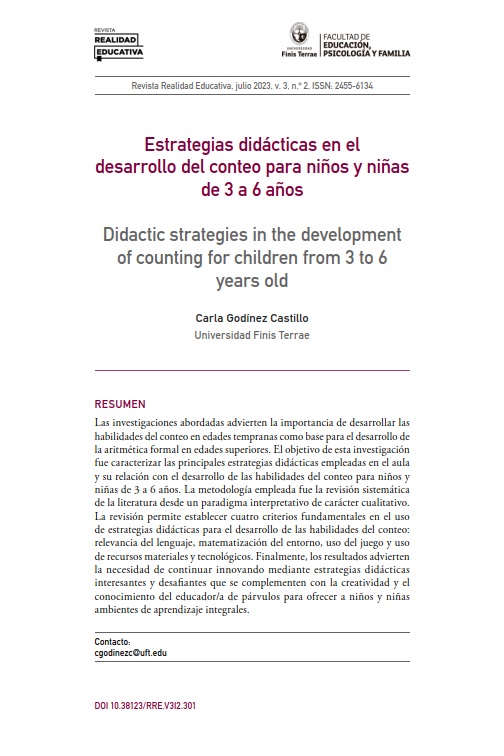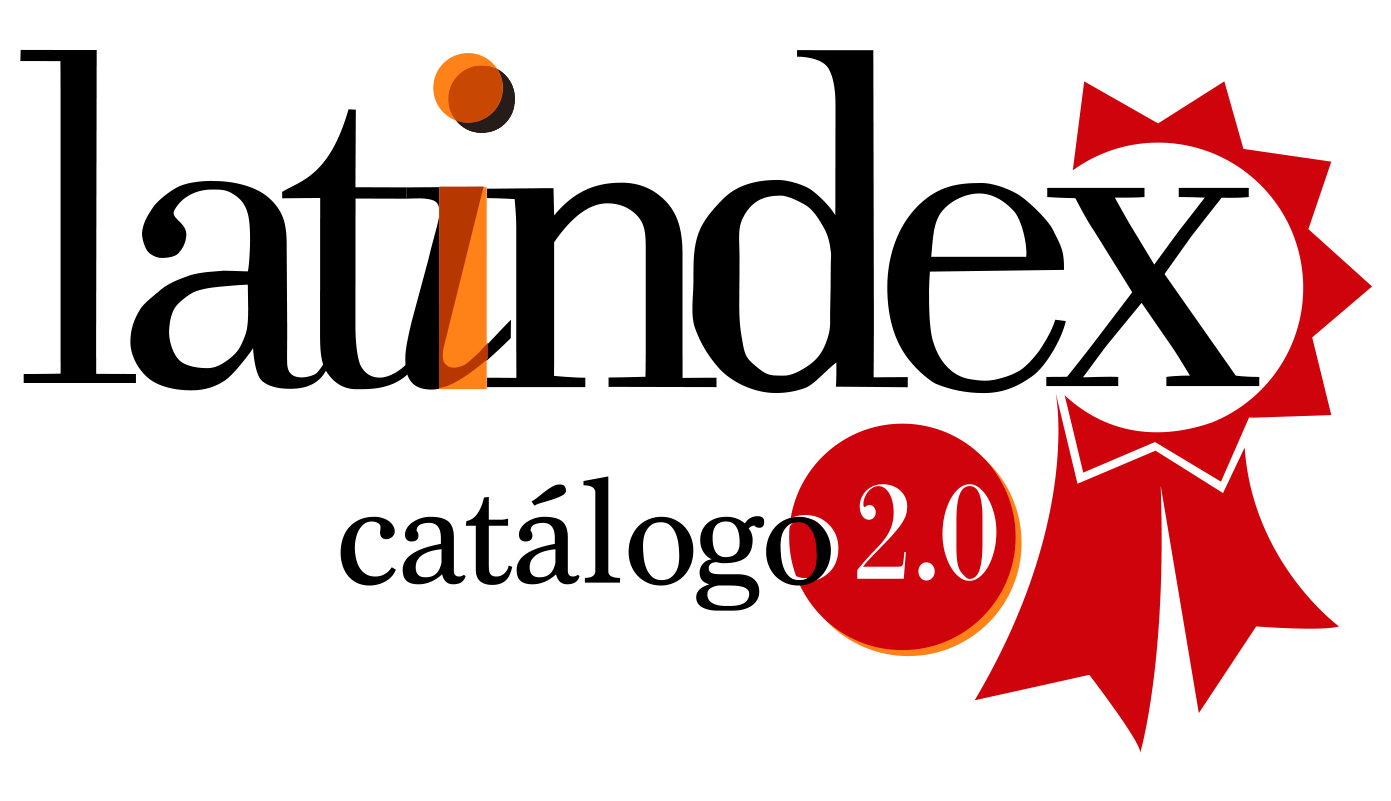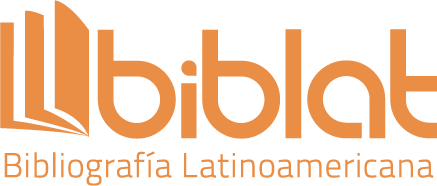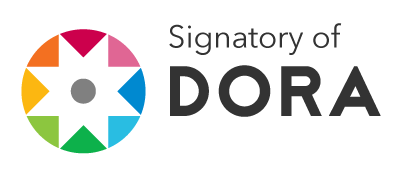Didactic strategies in the development of counting for children from 3 to 6 years old
DOI:
https://doi.org/10.38123/rre.v3i2.301Keywords:
early childhood, learning, count, teaching strategies, educational strategiesAbstract
Research has highlighted the importance of early development of counting skills as a foundation for later development of formal arithmetic. The purpose of this research was to characterize the main instructional strategies used in the classroom and their relationship to the development of content skills for children between the ages of 3 and 6. The methodology used was the systematic review of the literature from an interpretive paradigm with qualitative methodology. The review allows to identify 4 fundamental criteria in the use of didactic strategies for the development of counting skills: relevance of language, mathematization of the environment, use of games and use of material and technological resources. Finally, the results warn of the need to continue innovating with interesting and challenging didactic strategies, complemented by the creativity and knowledge of the early childhood educator, in order to offer the child integral learning environments.
Downloads
References
Abumuhfouz, I. y Mowafi, Y. (2019). An augmented real-world interactive classroom for developing learning numbers and counting skills for preschool children [conferencia]. Mobile and ubiquitous systems: Computing, networking and services (MobiQuitous 2019), Houston, USA. https://doi.org/10.1145/3360774.3360783
Alsina, A. (2012). Hacia un enfoque globalizado de la educación matemática en las primeras edades. Números, 80, 7-24. http://funes.uniandes.edu.co/3615/
Aragón, E., Navarro, J. y Aguilar, M. (2016). Domain-specific predictors for fluency calculation at the beginning of primary school education. Electronic Journal of Research in Educational Psychology, 14(3), 482-489. https://doi.org/10.14204/ejrep.40.15107
Arias de Sánchez, G., Gabriel, M., Anderson, A. y Turnbull, M. (2018). Code-switching explorations in teaching early number sense. Education Sciences, 8(1), 1-14. https://doi.org/10.3390/educsci8010038
Bravo, L. (2015). Psicología cognitiva y neurociencias de la educación en el aprendizaje del lenguaje escrito de las matemáticas. Revista de Investigación en Psicología, 17(2), 25. https://doi.org/10.15381/rinvp.v17i2.11256
Caba, A. (2007). Implicaciones para la filosofía de las matemáticas del constructivismo evolucionista de S. Dehaene. Quaderns de Filosofia i Ciéncia, 37, 16-28. http://hdl.handle.net/10550/43108
Cabrero, I. y Muñoz, M. (2019). Matemáticas y filosofía, tendencia a la correlación. Utopía y Praxis Latinoamericana, 24(87), 163-172. https://doi.org/10.5281/zenodo.3464057
Carrillo-González, G., Gómez-Ramírez, O. y Vargas-Rosero, E. (2007). La metasíntesis: una metodología de investigación. Revista de Salud Pública, 9(4), 609-617. https://revistas.unal.edu.co/index.php/revsaludpublica/article/view/96548
Castro, E., Cañadas, M. y Castro-Rodríguez, E. (2013). Pensamiento numérico en edades tempranas. Edma 0-6: Educación Matemática en la Infancia, 2(2), 1-11. https://dialnet.unirioja.es/servlet/articulo?codigo=4836753
Cheng, Z. (2012). Teaching young children decomposition strategies to solve addition problems: An experimental study. Journal of Mathematical Behavior, 31(1), 29-47. https://doi.org/10.1016/j.jmathb.2011.09.002
Clements, D. y Sarama, J. (2011). Early childhood mathematics intervention. Science, 333, 968-970. https://doi.org/10.1126/science.1204537
Cornejo, M. y Salas, N. (2011). Rigor y calidad metodológicos: un reto a la investigación social cualitativa. Psicoperspectivas, 10(2),12-34. https://dx.doi.org/10.5027/psicoperspectivas-Vol10-Issue2-fulltext-144
Cornu, V., Schiltz, C., Martin, R. y Hornung, C. (2018). Visuo-spatial abilities are key for young children’s verbal number skills. Journal of Experimental Child Psychology, 166, 604-620. https://doi.org/10.1016/j.jecp.2017.09.006
Desoete, A. y Stock, P. (2013). Mathematics instruction: Do classrooms matter? Learning Disabilities: A Contemporary Journal, 11(2), 17-26. https://eric.ed.gov/?id=EJ1039851
Díaz Díaz, R. (2009). Adquisición de la noción de número natural. Revista Iberoamericana de Educación, 49(5), 1-9. https://doi.org/10.35362/rie4952062
Fernández Escalona, C. (2016). Una propuesta didáctica para trabajar la secuencia numérica en el segundo ciclo de educación infantil. Enseñanza de las Ciencias, 34(2), 185-204. https://doi.org/10.5565/rev/ensciencias.1798
Göbel, S., McCrink, K., Fischer, M. y Shaki, S. (2018). Observation of directional storybook reading influences young children’s counting direction. Journal of Experimental Child Psychology, 166, 49-66. https://doi.org/10.1016/j.jecp.2017.08.001
Hernández, J. y Pérez, G. (2018). Estrategias para favorecer la habilidad del conteo en niños de nivel preescolar. Perspectivas Docentes, 28(64), 31-40. https://doi.org/10.19136/pd.a28n64.2383
Jacobi-Vessels, J., Brown, E., Molfese, V. y Do, A. (2016). Teaching preschoolers to count: Effective strategies for achieving early mathematics milestones. Early Childhood Education Journal, 44(1), 1-9. https://doi.org/10.1007/s10643-014-0671-4
Mercader, J., Herrero, M. y Siegenthaler, R. (2017). Influencia de las habilidades matemáticas básicas en el rendimiento posterior. International Journal of Developmental and Educational Psychology, 3(1), 243-252. https://doi.org/10.17060/ijodaep.2017.n1.v3.99
Miranda, S. y Ortiz, J. (2020). Los paradigmas de la investigación: un acercamiento teórico para reflexionar desde el campo de la investigación educativa. Revista Iberoamericana para la Investigación y el Desarrollo Educativo, 11(21). https://doi.org/10.23913/ride.v11i21.717
Mulyati, M., Yufiarti, Y., Supriyati, Y. y Suharti, S. (2019, 31 de octubre). Use of flannel puzzle to improve the initial of counting ability [conferencia]. IOP Journal of Physics: Conference Series, Seminar on Advances in Mathematics, Science and Engineering for Elementary School (SAMSES 2018), Yogyakarta, Indonesia. https://doi:10.1088/1742-6596/1318/1/012098
OCDE. (2017). Marco de evaluación y de análisis de PISA para el desarrollo: Lectura, matemáticas y ciencias. https://www.oecd.org/pisa/aboutpisa/ebook%20-%20PISA-D%20Framework_PRELIMINARY%20version_SPANISH.pdf
Ortiz, M. y Gravini, M. (2012). Estudio de la competencia matemática en la infancia. Psicogente, 15(27), 139-152. https://doi.org/10.17081/psico.15.27.1905
Paliwal, V. y Baroody, A. (2020). Cardinality principle understanding: the role of focusing on the subitizing ability. ZDM, 52(4), 649-661. https://doi.org/10.1007/s11858-020-01150-0
Ponce Pradenas, L. y Strasser Salinas, K. (2019). Diversidad de oportunidades de aprendizaje matemático en aulas chilenas de kínder de distinto nivel socioeconómico. Pensamiento Educativo, Revista de Investigación Latinoamericana, 56(2), 1-18. https://doi.org/10.7764/PEL.56.2.2019.10
Portal de Atención Ciudadana del Ministerio de Educación del Gobierno de Chile. (s.f.). Beebot. https://www.ayudamineduc.cl/ficha/beebot
Rocha, D. (2020). Estrategias didácticas para favorecer principios de conteo en alumnos de segundo grado de preescolar [Tesis de pregrado, Escuela Normal n.° 3 de Toluca]. Acervo digital educativo. https://acervodigitaleducativo.mx/handle/acervodigitaledu/49563
Rodríguez, M., Del Castillo, H. y Arteaga, B. (2021). El uso de aplicaciones móviles en el aprendizaje de las matemáticas: una revisión sistemática. Ensayos, 36(1), 17-34. https://doi.org/10.18239/ensayos.v36i1.2631
Rojano, T. (1994). La matemática escolar como lenguaje. Nuevas perspectivas de investigación y enseñanza. Enseñanza de las Ciencias, 12(1), 45-56.
Siegenthaler, R., Casas, A., Mercader, J. y Herrero, M. (2017). Habilidades matemáticas iniciales y dificultades matemáticas persistentes. International Journal of Developmental and Educational Psychology, 3(1), 233-241. https://doi.org/10.17060/ijodaep.2017.n1.v3.992
Soylu, F., Lester, F. y Newman, S. (2018). You can count on your fingers: The role of fingers in early mathematical development. Journal of Numerical Cognition, 4(1), 107-135. https://doi.org/10.5964/jnc.v4i1.85
Strauss, A. y Corbin, J. (2002). Bases de la investigación cualitativa. Técnicas y procedimientos para desarrollar la teoría fundamentada. Universidad de Antioquía.
Van Rinsveld, A., Schiltz, C., Majerus, S. y Fayol, M. (2020). When one-two-three beats two-one-three: Tracking the acquisition of the verbal number sequence. Psychonomic Bulletin & Review, 27, 122-129. https://doi.org/10.3758/s13423-019-01704-8
Villarroel, J. (2009). Investigación sobre el conteo infantil. E-Revista de Didáctica Ikastorratza, (4), 1-24. https://dialnet.unirioja.es/servlet/articulo?codigo=3067963
Ward, J. y Damjanovic, V. (2020). Planting seeds of numeracy: Supporting quantitative literacy in young children. Numeracy, 13(1), 1-14. https://doi.org/10.5038/1936-4660.13.1.5
Wickstrom, H., Pyle, A. y DeLuca, C. (2019). Does theory translate into practice? An observational study of current mathematics pedagogies in play-based kindergarten. Early Childhood Education Journal, 3, 287-295. https://psycnet.apa.org/doi/10.1007/s10643-018-00925-1

Published
How to Cite
Issue
Section
License
Copyright (c) 2023 Carla Godinez Castillo

This work is licensed under a Creative Commons Attribution-NonCommercial-NoDerivatives 4.0 International License.
Los contenidos de esta revista se distribuyen bajo una licencia Atribución/Reconocimiento-NoComercial-SinDerivados 4.0 Internacional.












